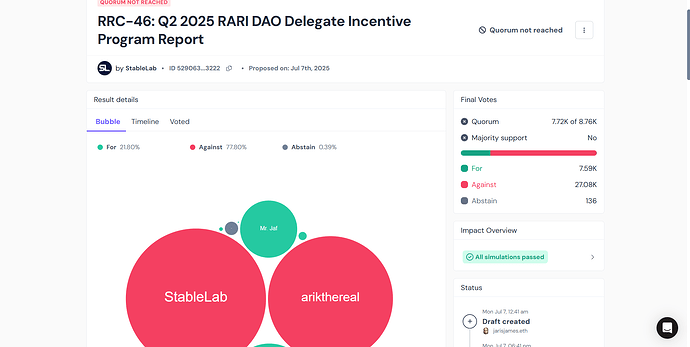Finalizing the Transition to Merit-Based Governance
Date of Submission: July 14, 2025
Authors: @jarisjames, @Jaf, @coffee-crusher
Abstract
This proposal finalizes the transition of RARI DAO governance from inherited delegations to a fully merit-based system. All Foundation-granted delegate voting power inherited from the previous Foundation on both Ethereum Mainnet and RARI Chain will be revoked.
RARI DAO has transitioned to a new Foundation and now operates with a staking-based governance system on RARI Chain, where voting power is earned through active participation, not granted by legacy authority.
This action brings governance into alignment with the DAO’s current strategy, closes the chapter on Foundation-appointed influence, and ensures that all contributors operate under a unified, transparent standard.
In the event that Ethereum Mainnet governance remains active, this proposal also enables a decentralized path forward by allowing the DAO to elect 3 new proposal sponsors via forum poll to decentralize access and reduce reliance on a single gatekeeper.
Motivation
RARI DAO has outgrown the early scaffolding of legacy delegations. With a new Foundation and a staking-based model live on RARI Chain, governance must now reflect earned participation, not outdated inherited power.
Leaving legacy delegations in place creates:
-
A mismatch between earned and inherited governance power
-
Governance imbalance, where certain delegates retain influence not tied to current merit or DAO involvement
This proposal closes that gap and establishes a single, fair rule for all contributors: governance must be earned.
Rationale
The DAO has already transitioned in practice, most new voting power now comes from staking or organic delegation. This proposal formalizes that transition and ensures the system is future-proof.
Passing this proposal will:
-
Reinforce a merit-based system where all power is earned
-
Eliminate lingering legacy influence from the prior Foundation era
-
Ensure staking incentives on RARI Chain carry real governance weight
-
Decentralize proposal sponsorship if Ethereum Mainnet governance persists
-
Establish accountability and clarity moving forward
Delegates who earned their position through staking or community support remain unaffected. This proposal does not penalize engagement, it simply retires unearned influence.
Key Terms
-
Legacy Delegations: Voting power granted by the previous RARI Foundation, typically in 2,000 RARI increments, with one notable 15,000 RARI delegation made on Ethereum Mainnet shortly before the Foundation’s transition.
-
These delegations exist on both Ethereum Mainnet and RARI Chain and were intended to bootstrap DAO activity during early development.
-
They are no longer aligned with the DAO’s incentive system or community standards.
Specifications
-
Revoke all legacy delegations issued by the previous Foundation on Ethereum mainnet and RARI Chain. These delegations were primarily granted in 2,000 RARI increments, with one exceptional case of a 15,000 RARI delegation made shortly before the Foundation transitioned.
-
Revoke all inherited RARI Chain delegations assigned by the old Foundation granted in 2,000 RARI increments, so all voting power is earned through organic delegation.
-
If Ethereum mainnet governance is to continue:
- Open a DAO forum poll to elect 3 proposal sponsors, each receiving 5,000 RARI delegated from the DAO Treasury, not the Foundation, to ensure full decentralization and independence from Foundation influence.
-
If the Foundation plans to fully migrate governance to RARI Chain, no redistribution of mainnet power is required
-
All voting power must come from organic delegation via staking, community reputation, or self-delegation.
Steps to Implement
-
The RARI Foundation revokes all legacy delegations from the previous Foundation on Ethereum mainnet
-
The Foundation also revokes all RARI Chain delegations inherited from the previous Foundation
-
If needed, a forum poll is initiated to elect 3 mainnet proposal sponsors
-
5,000 RARI is delegated to each elected sponsor (if Ethereum governance continues)
Timeline
-
July 14–17: Forum discussion period (3 days)
-
July 18: Submit proposal on RARI Chain
-
July 23: If passed, Foundation revokes all inherited delegations within 5 days
-
(Optional) by July 30: Forum poll to elect 3 new mainnet proposal sponsors (if needed)
-
(Optional) Aug 5–9: Voting power transferred to new sponsors (if needed)
Overall Cost
None. This proposal requires no new funds and is purely a governance alignment initiative.
